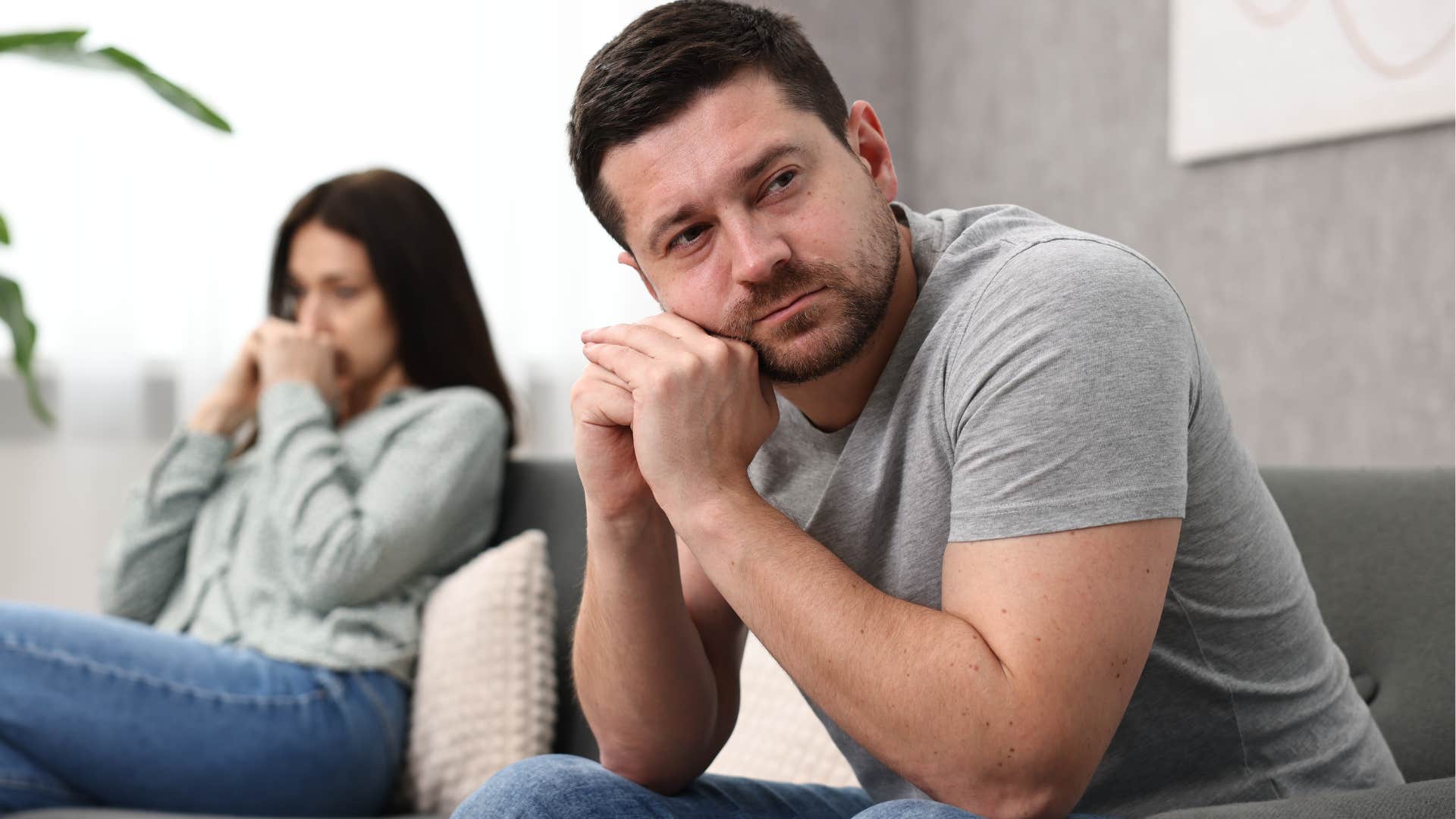11 Insufferable Phrases Used By People Who Refuse To Take Responsibility For Their Own Actions
People like this always trying to paint themselves as the victim.
 Ekateryna Zubal | Shutterstock
Ekateryna Zubal | Shutterstock Despite being essential to building personal self-esteem and trust in relationships, many people refuse to take responsibility for their mistakes, according to mental health consultant Jamie Cannon, because of misguided beliefs that it's a "weakness." Rather than make amends, support people through their hurt, and make space for people to share their own emotions, many would prefer to paint themselves as the victim, avoiding genuine apologies and taking accountability to protect their own ego.
Many of the insufferable phrases used by people who refuse to take responsibility for their own actions revolve around insecurity, which is why they tend to form habits and coping mechanisms that are particularly hard to break. These people are motivated by fear and anxiety, willing to grasp at a misguided sense of control with a victim mentality or refusing accountability, even at the expense of healthy relationships and connection.
Here are 11 insufferable phrases used by people who refuse to take responsibility for their own actions
1. 'Why are you so offended?'
 NDAB Creativity | Shutterstock
NDAB Creativity | Shutterstock
According to a student dissertation from Brigham Young University, people who feel internally insecure, offended, or judged in the face of a disagreement or argument may rely on phrases like this one to shift blame and deny accountability. They "counter-attack" the person expressing their needs or calling out misbehavior trying to paint themselves as the victim, arguing that they're misunderstanding or "overreacting."
Truly healthy communication relies upon trust, but when someone is actively avoiding accountability and consistently refusing to take responsibility for their mistakes, that trust is subtly sabotaged. In a romantic relationship, this can spark resentment, where a partner may feel less inclined to bring up their concerns or seek an apology in the future.
Even in the workplace or within a friendship, phrases like this that attempt to "flip the script" diminish trust, encouraging people to turn toward defensiveness, rather than grace and empathy.
2. 'That's none of my business'
 Srdjan Randjelovic | Shutterstock
Srdjan Randjelovic | Shutterstock
Experts from the Center for Couples Counseling clarify that it's not always easy to take accountability in relationships; grappling with trauma, feeling deep-rooted shame, and even experiencing insecurity, grief, and fears of judgment can make it incredibly hard to do. However, it's within this discomfort that people can grow, both personally and within their relationships.
Yet, it doesn't have to be "perfect." You don't have to give the perfect apology or take all the blame for hurt in your relationship by owning up to a mistake; rather, simply acknowledging it and being open to growing is the key to building trust.
By relying on one of the insufferable phrases used by people who refuse to take responsibility for their own actions, they're actively deflecting blame and avoiding vulnerability, which do the opposite, burdening their partner with shame about expressing their emotions and sabotaging the trust necessary to grow together.
3. 'I'm not responsible for how you feel'
 Ground Picture | Shutterstock
Ground Picture | Shutterstock
Of course, there's a certain healthy boundary everyone has to respect around other people's emotions. You shouldn't guilt yourself into overcompensating for someone else's reactions and emotions, but you should be conscious of when you actively hurt them.
An apology can go a long way, and if you're only ever deflecting and blaming people for expressing their emotions, you're likely sabotaging the potential for a better, healthier relationship.
Phrases like "You can feel how you want to feel" or "I'm not responsible for how you feel" are tell-tale signs of an insecure, narcissistic blame-shifter. They'd prefer to blame you for the hurtful language and behaviors they've done rather than acknowledge they're in the wrong.
4. 'You just don't understand'
 Anatoliy Karlyuk | Shutterstock
Anatoliy Karlyuk | Shutterstock
Trying to blame other people for misunderstanding their words or actions, the insufferable phrases used by people who refuse to take responsibility for their own actions are ironically rooted in insecurity.
While simultaneously grappling with their own insecurities and low self-esteem, they try to spark self-doubt and uncertainty in others. This behavior is a tell-tale sign of gaslighting — the kind of emotional manipulation that's often subtle and unsuspecting, even in close relationships.
Take note of the way you feel around other people, as it can tell you a lot more than their words will in many situations. If someone's phrases, tone of voice, or general demeanor is unsettling and frustrating to be around, that could be a sign that they're more emotionally manipulative than you (or even they) realize.
5. 'You're always targeting me'
 MAYA LAB | Shutterstock
MAYA LAB | Shutterstock
"An effective apology uses validation and curiosity to build trust and safety back into the relationship," therapist and life coach Tasha Seiter revealed. People use phrases like this instead of getting vulnerable and crafting a genuine apology, sparking uncertainty in a relationship, rather than security and trust.
Many of us who have experienced childhood trauma or toxic relationships in the past struggle with not immediately getting defensive when we feel "called out." However, the truth about disagreements and "calling out" misbehavior in relationships is that it's not typically an attack — it's an opportunity to grow.
By following the discomfort and actively dismissing defensiveness in the moment, you open up the opportunity to grow with open communication and empathy. You can comfort a partner, give an apology, and support them in their hurt without demonizing yourself as a person.
6. 'That's not my problem'
 fizkes | Shutterstock
fizkes | Shutterstock
Taking genuine responsibility for our mistakes and giving apologies can actually make us a lot happier, according to psychotherapist F. Diane Barth. Yet, so many of us still get defensive, angry, or frustrated when someone brings our hurtful language or misbehavior to light.
Occasionally, people feel pressured to criticize and attack others when they feel offended, but phrases like this illuminate the other side of the coin: people who prefer to deny, avoid, and isolate themselves from accountability.
Rather than leaning into their discomfort with empathy and honesty, they use phrases like this to dismiss and invalidate another person's concerns. From saying something hurtful, to being passive with quality time, and even making a small mistake, they prefer to deflect for the sake of their own ego, rather than get uncomfortable and give an honest and genuine apology.
7. 'There's nothing I can do about it'
 New Africa | Shutterstock
New Africa | Shutterstock
There are always steps you can take to help support other people and give them grace, even if it's not a straightforward apology. If someone expresses their hurt, craft a safe space for them to speak. Acknowledge their hurt and pave a better path forward. Actively listen while they're bringing up concerns. Brainstorm new boundaries... the list goes on.
If someone says there's "nothing they can do" about your hurt, they're not committed to building a healthy relationship with you. There's always something that can help partners to bond, build trust, and communicate more effectively, especially in high-stress or emotional situations like an argument.
8. 'I can't help it'
 Pheelings media | Shutterstock
Pheelings media | Shutterstock
Many of the insufferable phrases used by people who refuse to take responsibility for their own actions are reflected in arguments, when they're being called out for specific grievances or concerns. However, there's another way people avoid responsibility: refusing to grow or acknowledge their internal shortcomings.
They make excuses for toxic behaviors with phrases like this one, arguing their rudeness is simply "bluntness" or their hurtful comments are "simply the truth." By saying "I can't help it," they are shifting the blame to something that's beyond their control, even though they are actually the ones responsible for their own behavior.
9. 'You're gaslighting me'
 Monkey Business Images | Shutterstock
Monkey Business Images | Shutterstock
According to mental health and psychology educator Dr. Ana Yudin, therapy speak is "a prescriptive way that primarily therapists and therapy clients have learned to communicate with other people." However, people who understand and have access to these phrases may weaponize them to emotionally manipulate other people in certain situations.
They tend to accuse other people of "gaslighting them" or "taking advantage of their kindness" when it works to their benefit, without acknowledging and addressing their own role in hurting the other person.
While this kind of manipulation can be a shady and unsuspecting way for people to avoid accountability, it's becoming more and more popular in today's world, as social media and the internet's accessibility turn these phrases into more common knowledge.
10. 'That's not fair'
 StratfordProductions | Shutterstock
StratfordProductions | Shutterstock
People who use phrases like "that's not fair" to avoid taking responsibility for their own actions are generally fueled by a misguided victim mentality. They believe that things aren't fair because they're always being called out, rather than acknowledging that they may actually be the root cause of the problem.
People tend to fall into toxic habits and behaviors in a relationship without realizing it, so these conversations with a friend, co-worker, or partner are some of the only ways to reveal their own "blind spots" and toxic mentalities.
By trying to weaponize other people's misbehavior or blackmail them with things they've told you in confidence, you're only further sabotaging trust and the opportunity for a healthy and empathetic conversation.
11. 'I guess I just can't do anything right'
 simona pilolla 2 | Shutterstock
simona pilolla 2 | Shutterstock
Turning someone's need for support or an apology into a pity party, many people with chronic victim mentalities who refuse to take responsibility for their own actions tend to use phrases like this. They'll say "I just can't do anything right" or "everyone's always out to get me" to spark pity and sympathy in the people around them, completely dismissing a person's hurt or emotional expression and making themselves the center of attention.
Of course, true emotional intelligence is found in people who have the capacity to give a genuine apology, even when they may not agree with a person's experience or re-telling of events. They can own up to hurting another person's feelings and even support them in grappling with their hurt.
However, these kinds of self-centered people forgo any kind of empathy and intelligence. They'd prefer to protect their own ego and misguided victim mentality than take the time to acknowledge their own faults.
Zayda Slabbekoorn is a staff writer with a bachelor's degree in social relations & policy and gender studies who focuses on psychology, relationships, self-help, and human interest stories.

